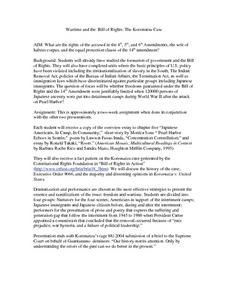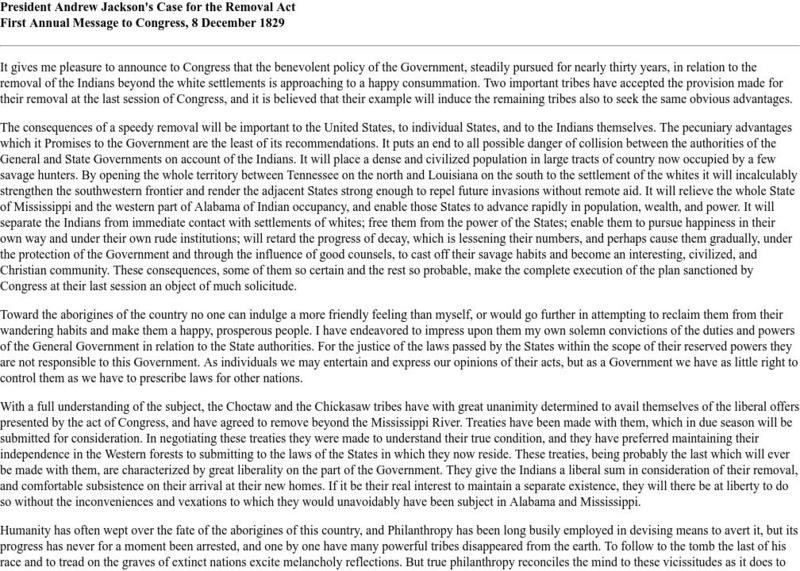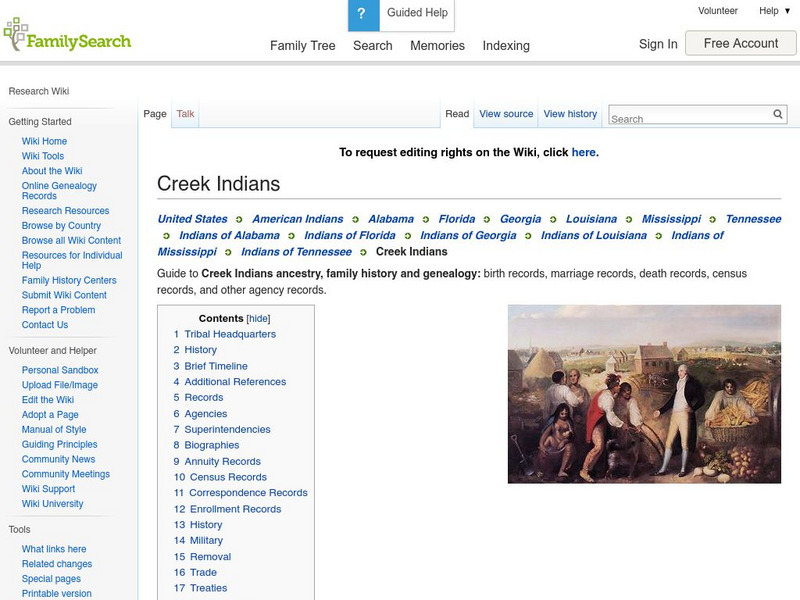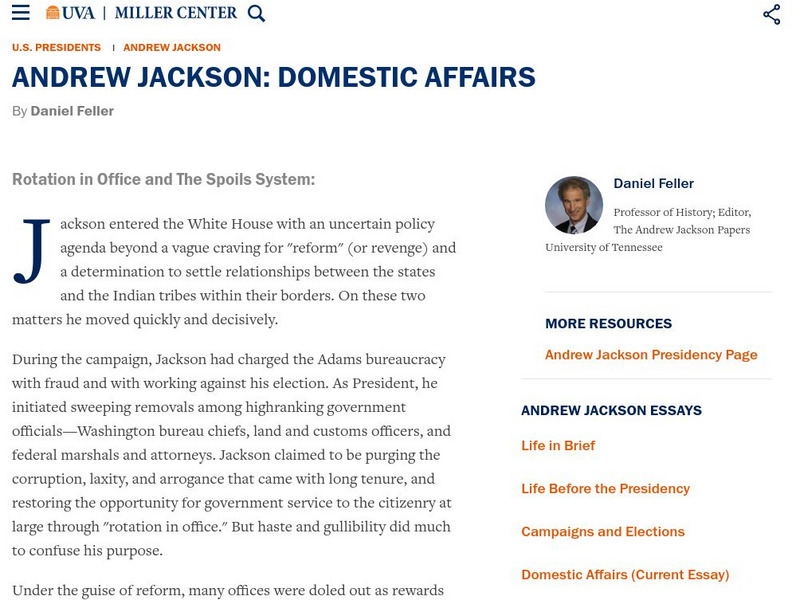Curated OER
The Trail of Tears
Students investigate the terms of the Indian Removal Act of 1830. They research the implications of the Indian Removal Act for Native American people. Students demonstrate an understand the impact of Manifest Destiny had on Native...
Curated OER
Does This Belong to You?
Fourth graders examine legislation that has been passed to protect the rights and religion of Native Americans. In groups, they discuss their feelings on others taking artifacts from Native American sites and what they do if they find...
Curated OER
Sunken Millions: The Way West
Recover sunken treasure with this interactive PowerPoint! Break your class into two teams: the divers and the surfers. They'll work together to answer 20 multiple choice questions, reviewing major events that occurred during the 1800s....
Curated OER
Andrew Jackson and the Trail of Tears
Students examine the three historical portraits Andrew Jackson, iam Pitt and Portrait of a Boy for symbolism. They research Andrew Jackson's involvement in the Cherokee Indians' Trail of Tears in North Carolina, and compose a portrait.
Curated OER
Wartime and the Bill of Rights: The Korematsu Case (Lesson 2)
Twelfth graders review how the government and Bill of Rights came into effect. Using primary source documents, they discuss if Japanese rights were violated when they were placed in internment camps after the bombing of Pearl Harbor. ...
Smithsonian Institution
Smithsonian: National Museum of the American Indian: The Removal Act
At first, the Trail of Tears only described the Cherokee removal of 1838. Later it included the removals of all southeastern Native nations. Take a close look at these primary sources from the Smithsonian which include a reproduction of...
US National Archives
Our Documents: President Andrew Jackson's Message, 'On Indian Removal'
Interactive image of the original document through which President Andrew Jackson called for "Indian Removal," in 1830. Includes transcription as well as background and overview of the text and results of the Indian Removal policy.
A&E Television
History.com: Native American History Timeline
Before Christopher Columbus came to America, the expansive territory was inhabited by Native Americans. Throughout the 16th and 17th centuries, as more explorers sought to colonize their land, Native Americans responded in various...
Digital History
Digital History: Indian Removal
The Indian Removal policy was inhumane and without empathy for the Native Americans who were forced from their lands. Read about the attempts to enforce federal treaties and the final removal of three major tribes from the Southeast.
Missouri State University
Delaware Town: Removal Era
Discussion of the removal of American Indians living east of the Mississippi River beginning in the late 1700s. Initially, these removals were voluntary, resulting from treaty negotiations. In 1830, Congress passed the Indian Removal...
Mount Holyoke College
International Relations: Andrew Jackson's Case for the Removal of Indians
Here, read the text to President Jackson's "First Annual Message to Congress, 8 December 1830," in which Jackson argues for the removal of Native Americans.
Other
Cincinnati Arts Association: Native American Heritage [Pdf]
This study guide, originally designed to accompany an artist-in-the-schools outreach program, can be used to teach about hidden Native communities that populated the Ohio region after the Indian Removal Act of 1830.
PBS
Pbs Learning Media: Cherokee Nation: Virtual Field Trip
An in-depth look at the lives of the Cherokee Indians, from their first encounters with Europeans to events, such as the Gold Rush and the signing of the Indian Removal Act by Andrew Jackson, that led to their forced relocation to Indian...
Ohio State University
Osu History Teaching Institute: Indian Removal
This lesson looks at the process whereby a policy of assimilation gave way to one of overt removal under President Jackson.
Other
Family Search: Creek Indians
This website provides a fairly comprehensive look at the Creek Indians including a brief history, a timeline, birth and death records, references, and links to historical records. These records include: census data, and information from...
Khan Academy
Khan Academy: Ap Us History: 1865 1898: Indian Wars and Battle of Little Bighorn
Discusses the series of events and conflicts in the Indian Wars that culminated in the Battle of the Little Bighorn, or Custer's Last Stand. Includes questions for students at end.
Annenberg Foundation
Annenberg Learner: Reading Like a Historian
During this 8-day unit, students will engage in collecting text evidence and then writing about their findings. They will answer the following question with credible, well-explained evidence: Why did Andrew Jackson and Elias Boudinot...
US National Archives
Our Documents: A National Initiative on American History, Civics, and Service
Our Documents is home to one hundred milestone documents that influenced that course of American history and American democracy. Includes full-page scans of each document, transcriptions, background information on their significance, and...
PBS
Pbs: Indian Territory
This site from PBS provides a short description and map of "the Indian Territory set aside by the Indian Removal Act of 1830 and the areas designated for each tribe."
Other
Eastern Band of Cherokee: History and Culture
A brief history of the Cherokee tribe in the southwest United States, its culture, government, and religion. Find out about the Cherokee who were subject to the Indian Removal Act of 1830, and see how the Cherokee in North Carolina have...
University of Virginia
Miller Center at Uva: u.s. Presidents: Andrew Jackson: Domestic Affairs
A comprehensive overview of the domestic issues facing Andrew Jackson in his presidency, from the "spoils system" to veto of the bank recharter to his Indian removal policy.
Other
American Indian Civics Project: 19th Century Indian Relations
This article provides an overview of Indian relations within the United States during the 19th century.
Northern Arizona University
Overview of Federal Indian Policy [Pdf]
Since the United States became a nation, federal Indian policy has seen many significant changes. Some of the shifts in policy may, at first glance, seem rather contradictory. However, when considering the underlying assumptions and when...
Other
History Today: Native Americans and the Federal Government
Andrew Boxer traces the origins of a historical issue still as controversial and relevant today as in past centuries. At the start of the twentieth century there were approximately 250,000 Native Americans in the USA - just 0.3 per cent...


















